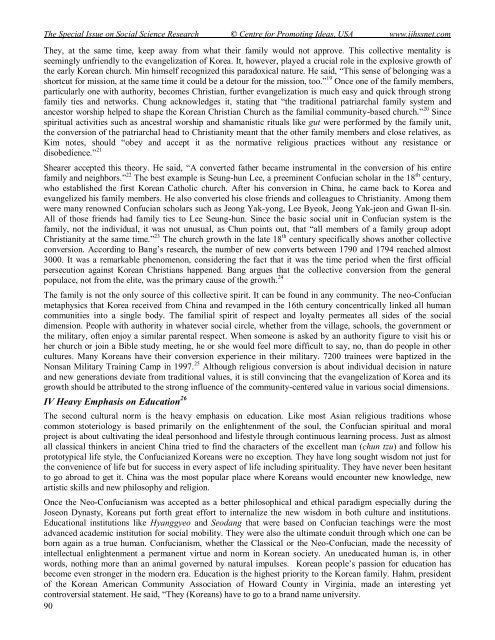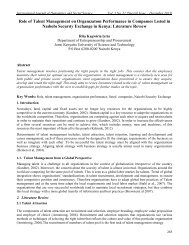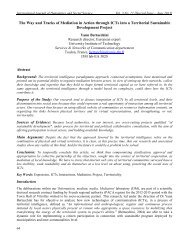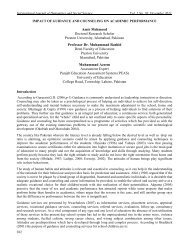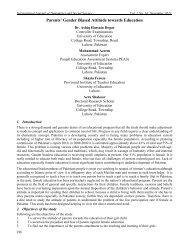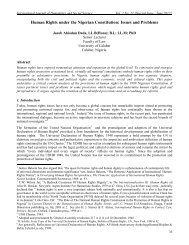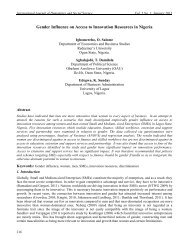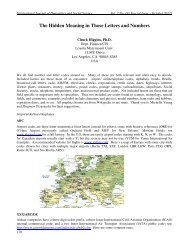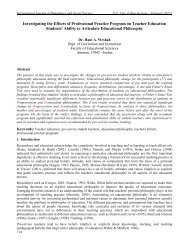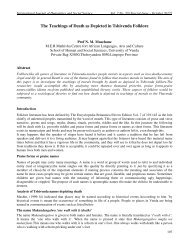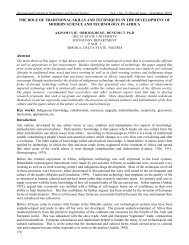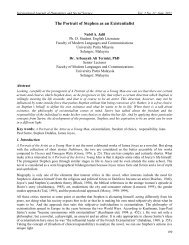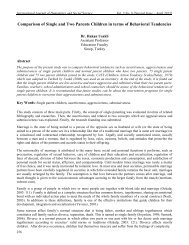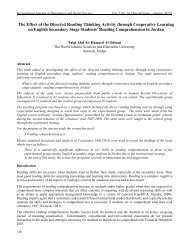Revisiting the Confucian Norms in Korean Church Growth
Revisiting the Confucian Norms in Korean Church Growth
Revisiting the Confucian Norms in Korean Church Growth
Create successful ePaper yourself
Turn your PDF publications into a flip-book with our unique Google optimized e-Paper software.
The Special Issue on Social Science Research © Centre for Promot<strong>in</strong>g Ideas, USA www.ijhssnet.com<br />
They, at <strong>the</strong> same time, keep away from what <strong>the</strong>ir family would not approve. This collective mentality is<br />
seem<strong>in</strong>gly unfriendly to <strong>the</strong> evangelization of Korea. It, however, played a crucial role <strong>in</strong> <strong>the</strong> explosive growth of<br />
<strong>the</strong> early <strong>Korean</strong> church. M<strong>in</strong> himself recognized this paradoxical nature. He said, “This sense of belong<strong>in</strong>g was a<br />
shortcut for mission, at <strong>the</strong> same time it could be a detour for <strong>the</strong> mission, too.” 19 Once one of <strong>the</strong> family members,<br />
particularly one with authority, becomes Christian, fur<strong>the</strong>r evangelization is much easy and quick through strong<br />
family ties and networks. Chung acknowledges it, stat<strong>in</strong>g that “<strong>the</strong> traditional patriarchal family system and<br />
ancestor worship helped to shape <strong>the</strong> <strong>Korean</strong> Christian <strong>Church</strong> as <strong>the</strong> familial community-based church.” 20 S<strong>in</strong>ce<br />
spiritual activities such as ancestral worship and shamanistic rituals like gut were performed by <strong>the</strong> family unit,<br />
<strong>the</strong> conversion of <strong>the</strong> patriarchal head to Christianity meant that <strong>the</strong> o<strong>the</strong>r family members and close relatives, as<br />
Kim notes, should “obey and accept it as <strong>the</strong> normative religious practices without any resistance or<br />
disobedience.” 21<br />
Shearer accepted this <strong>the</strong>ory. He said, “A converted fa<strong>the</strong>r became <strong>in</strong>strumental <strong>in</strong> <strong>the</strong> conversion of his entire<br />
family and neighbors.” 22 The best example is Seung-hun Lee, a preem<strong>in</strong>ent <strong>Confucian</strong> scholar <strong>in</strong> <strong>the</strong> 18 th century,<br />
who established <strong>the</strong> first <strong>Korean</strong> Catholic church. After his conversion <strong>in</strong> Ch<strong>in</strong>a, he came back to Korea and<br />
evangelized his family members. He also converted his close friends and colleagues to Christianity. Among <strong>the</strong>m<br />
were many renowned <strong>Confucian</strong> scholars such as Jeong Yak-yong, Lee Byeok, Jeong Yak-jeon and Gwan Il-s<strong>in</strong>.<br />
All of those friends had family ties to Lee Seung-hun. S<strong>in</strong>ce <strong>the</strong> basic social unit <strong>in</strong> <strong>Confucian</strong> system is <strong>the</strong><br />
family, not <strong>the</strong> <strong>in</strong>dividual, it was not unusual, as Chun po<strong>in</strong>ts out, that “all members of a family group adopt<br />
Christianity at <strong>the</strong> same time.” 23 The church growth <strong>in</strong> <strong>the</strong> late 18 th century specifically shows ano<strong>the</strong>r collective<br />
conversion. Accord<strong>in</strong>g to Bang‟s research, <strong>the</strong> number of new converts between 1790 and 1794 reached almost<br />
3000. It was a remarkable phenomenon, consider<strong>in</strong>g <strong>the</strong> fact that it was <strong>the</strong> time period when <strong>the</strong> first official<br />
persecution aga<strong>in</strong>st <strong>Korean</strong> Christians happened. Bang argues that <strong>the</strong> collective conversion from <strong>the</strong> general<br />
populace, not from <strong>the</strong> elite, was <strong>the</strong> primary cause of <strong>the</strong> growth. 24<br />
The family is not <strong>the</strong> only source of this collective spirit. It can be found <strong>in</strong> any community. The neo-<strong>Confucian</strong><br />
metaphysics that Korea received from Ch<strong>in</strong>a and revamped <strong>in</strong> <strong>the</strong> 16th century concentrically l<strong>in</strong>ked all human<br />
communities <strong>in</strong>to a s<strong>in</strong>gle body. The familial spirit of respect and loyalty permeates all sides of <strong>the</strong> social<br />
dimension. People with authority <strong>in</strong> whatever social circle, whe<strong>the</strong>r from <strong>the</strong> village, schools, <strong>the</strong> government or<br />
<strong>the</strong> military, often enjoy a similar parental respect. When someone is asked by an authority figure to visit his or<br />
her church or jo<strong>in</strong> a Bible study meet<strong>in</strong>g, he or she would feel more difficult to say, no, than do people <strong>in</strong> o<strong>the</strong>r<br />
cultures. Many <strong>Korean</strong>s have <strong>the</strong>ir conversion experience <strong>in</strong> <strong>the</strong>ir military. 7200 tra<strong>in</strong>ees were baptized <strong>in</strong> <strong>the</strong><br />
Nonsan Military Tra<strong>in</strong><strong>in</strong>g Camp <strong>in</strong> 1997. 25 Although religious conversion is about <strong>in</strong>dividual decision <strong>in</strong> nature<br />
and new generations deviate from traditional values, it is still conv<strong>in</strong>c<strong>in</strong>g that <strong>the</strong> evangelization of Korea and its<br />
growth should be attributed to <strong>the</strong> strong <strong>in</strong>fluence of <strong>the</strong> community-centered value <strong>in</strong> various social dimensions.<br />
IV Heavy Emphasis on Education 26<br />
The second cultural norm is <strong>the</strong> heavy emphasis on education. Like most Asian religious traditions whose<br />
common stoteriology is based primarily on <strong>the</strong> enlightenment of <strong>the</strong> soul, <strong>the</strong> <strong>Confucian</strong> spiritual and moral<br />
project is about cultivat<strong>in</strong>g <strong>the</strong> ideal personhood and lifestyle through cont<strong>in</strong>uous learn<strong>in</strong>g process. Just as almost<br />
all classical th<strong>in</strong>kers <strong>in</strong> ancient Ch<strong>in</strong>a tried to f<strong>in</strong>d <strong>the</strong> characters of <strong>the</strong> excellent man (chun tzu) and follow his<br />
prototypical life style, <strong>the</strong> <strong>Confucian</strong>ized <strong>Korean</strong>s were no exception. They have long sought wisdom not just for<br />
<strong>the</strong> convenience of life but for success <strong>in</strong> every aspect of life <strong>in</strong>clud<strong>in</strong>g spirituality. They have never been hesitant<br />
to go abroad to get it. Ch<strong>in</strong>a was <strong>the</strong> most popular place where <strong>Korean</strong>s would encounter new knowledge, new<br />
artistic skills and new philosophy and religion.<br />
Once <strong>the</strong> Neo-<strong>Confucian</strong>ism was accepted as a better philosophical and ethical paradigm especially dur<strong>in</strong>g <strong>the</strong><br />
Joseon Dynasty, <strong>Korean</strong>s put forth great effort to <strong>in</strong>ternalize <strong>the</strong> new wisdom <strong>in</strong> both culture and <strong>in</strong>stitutions.<br />
Educational <strong>in</strong>stitutions like Hyanggyeo and Seodang that were based on <strong>Confucian</strong> teach<strong>in</strong>gs were <strong>the</strong> most<br />
advanced academic <strong>in</strong>stitution for social mobility. They were also <strong>the</strong> ultimate conduit through which one can be<br />
born aga<strong>in</strong> as a true human. <strong>Confucian</strong>ism, whe<strong>the</strong>r <strong>the</strong> Classical or <strong>the</strong> Neo-<strong>Confucian</strong>, made <strong>the</strong> necessity of<br />
<strong>in</strong>tellectual enlightenment a permanent virtue and norm <strong>in</strong> <strong>Korean</strong> society. An uneducated human is, <strong>in</strong> o<strong>the</strong>r<br />
words, noth<strong>in</strong>g more than an animal governed by natural impulses. <strong>Korean</strong> people‟s passion for education has<br />
become even stronger <strong>in</strong> <strong>the</strong> modern era. Education is <strong>the</strong> highest priority to <strong>the</strong> <strong>Korean</strong> family. Hahm, president<br />
of <strong>the</strong> <strong>Korean</strong> American Community Association of Howard County <strong>in</strong> Virg<strong>in</strong>ia, made an <strong>in</strong>terest<strong>in</strong>g yet<br />
controversial statement. He said, “They (<strong>Korean</strong>s) have to go to a brand name university.<br />
90


